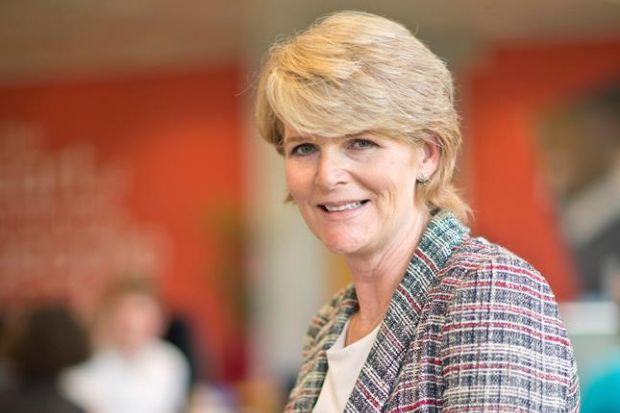At the Times Higher Education Awards’ glitzy ceremony held at the Grosvenor House Hotel each year, Mary Curnock Cook’s moment on stage is usually a memorable one.
Whether it is taking selfies with compere Richard E. Grant in front of 1,200 guests or bantering with Rob Brydon, another MC of recent years, the former Ucas chief executive is clearly in her element, visibly enjoying the limelight on her way to presenting a prize.
“I promise myself when I go to the THE awards that I won’t do anything like that up [on the stage], but I always end up playing the fool,” said Ms Curnock Cook, who stepped down from the UK admissions body after seven-and-a-half years at the helm.
Her fearless sparring with celebrity comics on THE’s big night demonstrates why Ms Curnock Cook has become such a popular figure in higher education. She is unlike any other sector leader and is certainly not a beige technocrat.
Her popularity can also perhaps be attributed to her being one of the sector’s strongest champions since taking the reins at the Cheltenham-based organisation, speaking out frequently about the growing problem of getting boys from deprived backgrounds into university.
“I always felt a bit ashamed about not going to university after leaving school – perhaps that’s why I am such a loud advocate of higher education,” said Ms Curnock Cook in an interview before she resigned from Ucas at the end of April.
Having left school aged 16 to work as a secretary, she eventually made it to university in her forties, gaining an MSc in business at London Business School in 2002.
“I went to London Business School when I was in the world of senior management but I realised that not having a degree was a gap in my CV,” she said.
Ms Cumnock Cook arrived at Ucas in January 2010 and set about transforming an organisation that often hit the headlines for computer system crashes on A-level results day.
“When I went into the job, my eyes were not fully open to how much Ucas needed to reform,” said Ms Curnock Cook.
“It was not immediately apparent how much the technology was not coping with the volume [of applications] it faced and, in my first January, I remember applications increasing 23 per cent in a single year,” she added. That led her to “completely rebuild the technology stack” used by Ucas, which has fared much better on its busiest day in recent years.
Changing the governance of Ucas, whose board previously contained representatives from schools, colleges, local government and universities, was also a crucial – if controversial – decision, she explained. Instead, figures with more specialist backgrounds arrived to help bring Ucas into the smartphone-led era inhabited by Generation Y applicants.
“Ucas has been around for about 60 years – it almost has national treasure status – so it was hard work preserving it in a very fast-changing environment,” said Ms Curnock Cook.
Some vice-chancellors might complain, however, that Ucas has veered too far away from its initial purpose as a charity for, and owned by, the sector. On Ms Curnock Cook’s watch, revenues of its commercial arm, Ucas Media – three-quarters of which come from education institutions – have soared from £9.7 million in 2010 to £16.8 million in 2016.
As the main player in the student data market, universities have little choice but to buy Ucas’ advertising products, given its near-monopolistic grip on student data, senior managers complain. It is the less affluent institutions that have to shell out the most, they add.
“I point-blank refuse to apologise for the success of Ucas Media,” Ms Curnock Cook said in response to these grievances. “I do not think Ucas services requested by individual institutions should be paid by the whole sector.”
The complaint that Ucas is in essence selling universities’ data back to them is also wrong, she said.
“We have to create this data – it does not just pop out,” she said. “If it was not for Ucas Media, we would have to put up the costs we charge [institutions] by 50 per cent.”
As she departs Ucas, she stated that the organisation was in “very good shape” and ready to withstand any challenges caused by a demographic dip, which will see domestic student numbers decline until 2020.
Her own short-term career plans are unclear, but she said she will continue working in education, “two days a week paid, two days a week unpaid”.
She “definitely” will not become a vice-chancellor, she told THE, but, like her awards evening cameos, she seems in no hurry to exit the stage of education.
Register to continue
Why register?
- Registration is free and only takes a moment
- Once registered, you can read 3 articles a month
- Sign up for our newsletter
Subscribe
Or subscribe for unlimited access to:
- Unlimited access to news, views, insights & reviews
- Digital editions
- Digital access to THE’s university and college rankings analysis
Already registered or a current subscriber? Login








